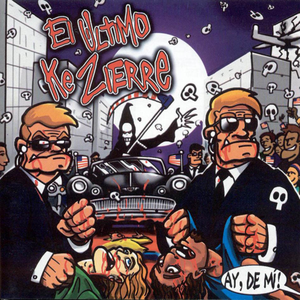The line-up would change again before releasing their fourth disc, Esperando el viento, with Manolo being replaced by Nano, in 1995. After this disc, they released A cara de perro in 1998, Senderos de este infierno, a live disc from 1999, and Bulla, in 2000.
Another change took place, with Viçent leaving the band and being replaced by Tonet. They released a new disc in 2002, Veneno, followed by Ay, de mi! in 2003, and Insurgente in 2005. With Vivos... por domesticar!, El último Ke Zierre gave us an incredible live disc in 2006, and they finally recorded Quemaste tus alas de angel in 2007.
In the middle of the promotional tour, first Nano and then Tonet decide to leave the group and they were replaced by Kusio (drums) and Sam (guitar); though, the group decides to continue the tour.
El último Ke Zierre was a group that was never in a hurry to do anything; they were dedicated to playing, composing and enjoying the music, not forcing anything, which has made them sound original in their work.
Hay quien nace rey
El Último Ke Zierre Lyrics
Jump to: Overall Meaning ↴ Line by Line Meaning ↴
¿Quién te dice lo que es malo?,
¿El patrón?, ¿El alcalde?,
¿O es tu cuerpo quien lo sabe?.
Ninguno te dice: "guarda tu dinero",
Ninguno te dice: "hoy puedes quedarte en casa",
Ninguno te dice: "tranquilo hombre, serás tu primero",
Ninguno te dice: "tómatelo con más calma".
Y el peón tiene su sino:
Su oficio es el sacrificio
Y vivir con la ironía
De elegir a quién le humilla.
¿Quién te dice lo que es bueno?,
¿Quién te dice lo que es malo?,
¿El patrón?, ¿El alcalde?,
¿O es tu cuerpo quien lo sabe?.
Ninguno te dice que... te está matando,
Ninguno te dice que es lo que te está oxidando,
Hay quién nace rey y hay quién nace mulo,
Hay quién nace reina y hay quién nace en las basuras.
In "Hay quien nace rey," El Último Ke Zierre explores themes of power dynamics and societal hierarchies. The lyrics challenge the notion of authority figures telling individuals what is right and wrong, instead suggesting that one's body and personal experience hold the ultimate truth. The song speaks to the experiences of those who are born into lower social classes, who are constantly told what to do and who must constantly sacrifice for those in power. The chorus highlights the contrast between those who are born into privilege and those who are not - some are born as kings and queens, while others are born as servants or even in poverty.
Throughout the song, the lyrics paint a picture of a struggle for power and autonomy. The "peón," or worker, is relegated to a life of sacrifice and must choose to submit to those who oppress them. The song's refrain emphasizes the message that those in power do not always have the best intentions, and that there are those who are born with inherent privilege while others are not. The song's final line - "there are those who are born as kings and queens and there are those who are born in the trash" - is a powerful statement about the existence of systemic inequality.
Overall, the lyrics of "Hay quien nace rey" are a poignant commentary on social injustice and the struggle for autonomy. The song is a powerful testament to the human capacity for resilience in the face of oppression.
Line by Line Meaning
¿Quién te dice lo que es bueno?
Who tells you what is good?
¿Quién te dice lo que es malo?
Who tells you what is bad?
¿El patrón?, ¿El alcalde?
The boss? The mayor?
¿O es tu cuerpo quien lo sabe?.
Or does your body know it?
Ninguno te dice: "guarda tu dinero"
No one tells you to "save your money"
Ninguno te dice: "hoy puedes quedarte en casa"
No one tells you: "today you can stay home"
Ninguno te dice: "tranquilo hombre, serás tu primero"
No one tells you: "take it easy man, you'll be the first"
Ninguno te dice: "tómatelo con más calma".
No one tells you: "take it easy".
Y el peón tiene su sino:
And the pawn has his fate:
Su oficio es el sacrificio
His profession is sacrifice
Y vivir con la ironía
And living with irony
De elegir a quién le humilla.
Of choosing who humiliates him.
Ninguno te dice que... te está matando,
No one tells you that...it's killing you,
Ninguno te dice que es lo que te está oxidando,
No one tells you what is corroding you,
Hay quién nace rey y hay quién nace mulo,
There are those born as kings and those born as mules,
Hay quién nace reina y hay quién nace en las basuras.
There are those born as queens and those born in the garbage.
Contributed by Violet N. Suggest a correction in the comments below.
